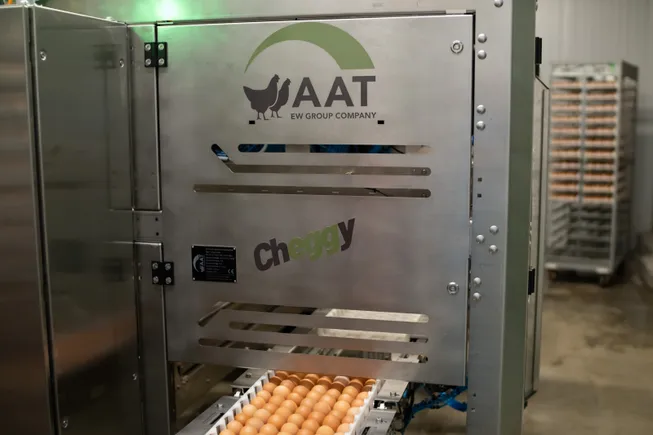Editor’s note: Agtech Seedlings is a weekly roundup of the latest in agriculture technology news, digging into venture funding, product announcements and other innovation milestones. Have news to share? Email us here.
In-ovo sexing reaches the US
An egg hatchery in Iowa has become the first site in the United States to offer in-ovo sexing technology, giving poultry companies a more humane option to current practices of killing male chicks.
Chicks from the hatchery are expected to reach its first customer NestFresh Eggs by Dec. 13. Eggs sourced from in-ovo sexed hens are set to enter the marketplace by June 2, 2025. An identical machine is operational at a hatchery in Texas.
The technology, a large sorting machine called Cheggy, can determine the sex of a chick before it hatches by measuring differences in light spectrums on feather color. The machine, created by Germany-based Agri Advanced Technologies, can sort up to 25,000 brown layer hatching eggs per hour and unit.
“We are thrilled to introduce this revolutionary non-invasive in-ovo sexing technology to the United States,” Jörg Hurlin, Managing Director of AAT, said in a statement. “The high accuracy rate and unparalleled efficiency of this machine will undoubtedly transform the egg production industry with growing demand for welfare and sustainability practices in the poultry industry.”
While In-ovo sexing has gained prominence in Europe, U.S. egg producers have been slow to adopt the technology largely because consumers are unaware of the issue. Momentum in the U.S. has been building, however, and a number of egg producers this year were jockeying to become the first to deploy the technology.
“Macerating male chicks soon after they hatch is still standard in the egg industry, as they do not lay eggs and are therefore deemed useless,” Hillary Hendrickson, senior corporate relations manager at Mercy for Animals, said in August. “As consumers learn more about the horrors of chick culling, they will support companies that have banned this barbaric practice.”
AquaBounty to end production of gene-edited salmon
AquaBounty, which made waves for becoming the first to receive commercial approval to sell a gene-edited animal in the U.S., said it will shut down operations after running out of cash.
CEO Dave Melbourne voluntarily resigned effective Dec. 6, and other senior executive positions have been eliminated, including the roles of chief operating officer and chief people officer.
The company will wind down hatchery operations at its last remaining farm in Bay Fortune, Canada. David Frank, chief financial officer and interim chief executive officer, said all remaining fish will be culled and that the company will begin “a reduction of substantially all personnel over the course of the next several weeks.”
Earlier this year, AquaBounty sold a fish farm in Indiana and listed another site in Rollo Bay, Canada, for sale.
“We have been working for over a year to raise capital, including the sale of our farms and equipment,” Frank said in a statement. “Unfortunately, these efforts have not generated enough cash to maintain our operating facilities.”
The company will assess alternatives for its Ohio farm project, which was set to be a large commercial-scale, land-based salmon farm. Construction began in 2022.
Despite becoming the first to win approval from the U.S. Food and Drug Administration to commercially sell a gene-edited animal, the company has seen continued losses over the past year and posted a recent drop in Q3 sales. Consumer wariness over gene-edited technology sparked a campaign to keep AquaBounty out of major grocery retailers, food service companies and restaurants.
“This company was propped up by the hype but had nothing of value to sell,” Lucy Sharratt, Coordinator of the Canadian Biotechnology Action Network, said in a statement. “Genetically engineered food is a losing investment.”
Syngenta and Enko use AI to advance sustainable weed control
Crop protection giant Syngenta said it’s reached a new milestone in a collaboration with agricultural research and development firm Enko to discover novel and more sustainable weed control molecules.
Syngenta and Enko have been working to target a new Mode of Action, or the way in which an herbicide kills unwanted plants. The companies said they’ve discovered “new leads” to target this Mode of Action using Enko’s discovery platform that runs on artificial intelligence.
The announcement comes as Syngenta works to advance a “Safer by Design” research strategy that aims to use more sustainable weed control technologies that deliver higher yields while reducing impacts to the planet.
The goal is to discover novel weed control molecules capable of controlling a broad spectrum of weeds that affect vital cropping systems worldwide. Resistant, aggressive weeds and grasses remain a major challenge to crop health, requiring new modes of action and different methods to control invasive plants such as Palmer amaranth, waterhemp, blackgrass and Italian ryegrass.
“This novel solution will be an important breakthrough in the field of weed control and will represent a critical tool for resistance management,” Camilla Corsi, Syngenta Crop Protection head of research, said in a statement.



